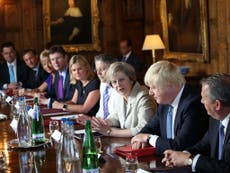The Independent's journalism is supported by our readers. When you purchase through links on our site, we may earn commission.
Forget Brexit, it's melting railways and GP shortages that will bring down Theresa May's government
It would do the cabinet well to think of the capital and its struggling commuters as they watch red kites soar in the azure Chilterns sky today at Chequers

All eyes will be on Chequers today, as the prime minister desperately tries to unite her warring cabinet over Brexit. There remains the faint possibility that a failure to do so will bring down the government – but it seems eminently more likely that a new customs proposal will be sufficiently fudgy that the show will be kept on the road for a while yet (doubts in Brussels notwithstanding).
Set in a tranquil Buckinghamshire valley between beech-wooded hills, Chequers is a perfect spot for ministers to hammer out their differences in relative seclusion. It is a world away from the hubbub of London.
But it would do the cabinet well to think of the capital and its people as they watch red kites soar in an azure Chilterns sky today. In particular they might spare a thought for commuters struggling to get to work; sweat and anger battling for primacy on overcrowded, delayed trains.
This week has been a grim one for rail users, especially those unfortunate enough to require a service from Victoria, London’s second busiest station. A power failure on Wednesday night led to major disruption with the signalling system throughout Thursday and into today. Passengers were sardined into broiling trains if they were lucky; and left to wend their way on buses or on foot if they were not.
Trains from Euston and Paddington have also been seriously delayed in recent days, while in Liverpool commuters were offered ice lollies by way of an apology for recent delays caused by the heatwave, which has left the track buckled in places.
Recent problems in St Albans led to commuters attempting to kick down the ticket barriers; and at Fenchurch Street in east London last week passengers complained of “third world services” during a period of acute disruption. All this comes hot on the heels of a botched timetable introduction that saw swathes of the network in the north-west of England grind to a halt.
If Brexit remains at the top of the prime minister’s agenda, the ongoing rail problems should not, therefore, be very far behind. After all, if the process of EU withdrawal continues to divide the nation, dodgy trains have the potential to unite it: and that will be bad news for the government.
Rather like GP appointments, getting a train is – for many – a regular necessity; and is too often beset by difficulty. When things don’t go to plan, the consequences are immediate, significant and surprisingly visceral. What’s more, just as blame for failings in the health service are laid at the door of ministers, so ultimately they are held responsible for delays and cancellations on the rail network.
Even when specific problems may more reasonably be regarded as the fault of the private rail operators, since franchises are awarded by the department for transport, the government cannot in the end avoid all responsibility. With Jeremy Corbyn holding out the possibility of renationalising the entire system, the notion of the rail network as effectively a public service is being ever more firmly established in social and political discourse.
It should go without saying that the eventual outcome of the Brexit negotiations will have a significant and long-lasting effect on the UK. But just as the issue did not dominate the last election, so it is quite conceivable that it will not be central to the next – especially if Theresa May can struggle through to 2020. Already there is considerable apathy: YouGov’s tracker poll in June showed 56 per cent of respondents were “fairly” or “very” bored by news about Brexit.
The danger for the PM is that the process of leaving the EU ends up not only creating economic uncertainly (and thus imperilling investment), but that it also becomes so all-consuming that other, important matters are simply not given the political attention they require.
Her government doesn’t have a particularly caring reputation as it is – apparent disinterest in everyday things that matter to everyday people may prove disastrous. Insufficient GP capacity and a melting train network are much more real to the majority than customs arrangements and intelligence-sharing agreements; and much more likely to prove electorally disastrous to the Tories.
So good luck at Chequers, prime minister; the views up to Coombe Hill and its Boer War monument are delightful. But don’t forget that it’s important to see the wood as well as the trees.





Join our commenting forum
Join thought-provoking conversations, follow other Independent readers and see their replies